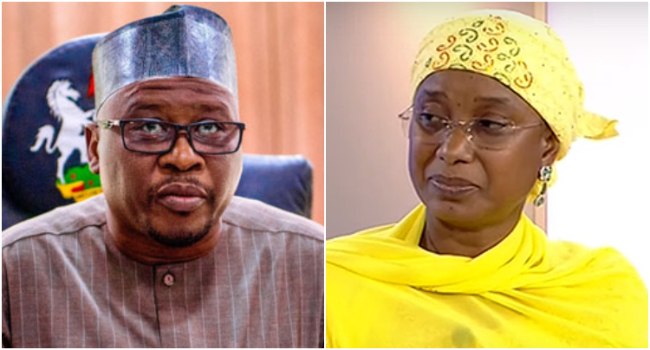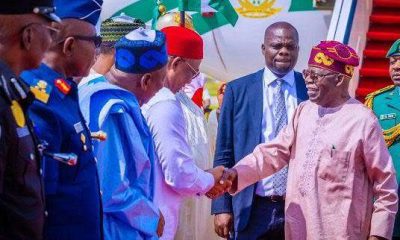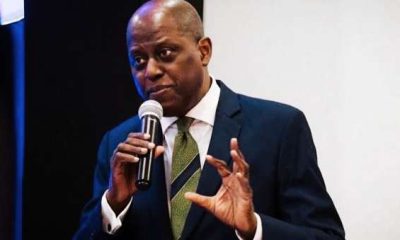Headlines
Failed plot to impose Binani signposts 2023 polls

OBINNA EZUGWU
The eventual declaration, on Tuesday, of Umaru Fintri, governor of Adamawa State, as winner of the state governorship election, brought to a conclusion the 2023 general elections, and became the anticlimax of an exercise that held much promise, but ultimately delivered despair in many people’s reckoning, with nearly all credible local and foreign observers concluding that it fell short of minimum standards.
With the March 18 governorship election declared inconclusive by the Independent National Electoral Commission (INEC), a supplementary election was scheduled for Saturday, April 15.
On Sunday, as collation was underway, the state Resident Electoral Commissioner (REC), Hudu Yunusa Ari, prematurely declared Aishatu Dahiru, alias Binani, candidate of the All Progressives Congress (APC), as the winner, contrary to the provisions of the Electoral Act, which empowers only the Returning Officer to announce results, albeit while collation was still ongoing, and Fintri was clearly ahead.
At the time, results had been declared for only 10 of the 20 local government areas (LGAs) in the supplementary poll, which indicated Fintiri was leading, having won in seven LGAs against Binani’s three.
The declaration by Ari was quickly followed by an acceptance speech by the APC candidate.
Amid the outrage, INEC issued a statement declaring the result announced by Ari as null and void. The electoral body also suspended collation, while protests rocked the state.
At about 5:49 pm on Tuesday, however, the electoral body commenced collation, after the court declined to grant Binani an order seeking to stop further collation, and Fintri was eventually declared winner, having scored 430, 821 votes to defeat Binani, who had 396,788
Meanwhile, in the Saturday’s rerun, Fintiri polled 9,337 votes against Binani’s 6,513 votes.
Ultimately, what Ari and his sponsors may have intended to be a civilian coup failed, and the 2023 general election cycle was brought to end without a major civil unrest. The now suspended REC has escaped and is nowhere to be seen, amid calls for his arrest and prosecution, according to INEC.
But as the battles shift to the courts, many continue to wonder what could have given the fugitive REC the audacity to declare false results in the brazen manner that he did. Perhaps, even more befuddling, is the fact that while he announced the results, the state commissioner of police, Mohammed Barde, who has now been redeployed by the Inspector General of Police, Usman Baba, was sitting right beside him, while his men provided security cover for the illegality to be carried out.
President Muhammadu Buhari, who appoints INEC RECs, had on Friday, days after the act was committed, announced Ari’s suspension, pending the outcome of an investigation into what transpired. But many are not convinced that he acted alone, and the inability of the police to arrest him has further led to speculations that he may indeed, have had the backing of the power that be in Abuja.
Before the Adamawa poll was declared inconclusive after the first election on March 18, for instance, it was alleged that the federal government mandated the said REC to ensure the victory of Binani at the polls, with the possible intention of using her emergence as the first elected female governor in the country to make a statement. The government, has however, denied backing Ari.
It is believed that there were forces behind the event, who wanted to stop Atiku Abubakar, the strong man of Adamawa politics, from further political relevance with the loss of the state. Out of office, President Buhari would cede political leadership of the north to Atiku. But without a state as a base, Atiku himself, would be politically irrelevant.
It was also hinted that the involvement of the police suggests the highest level of connection, as the Commissioner of police, state director of DSS, and NCDSC part in the plot, point to high political approval, because the commissioner take order directly from the IG.
But while Adamawa, the last of the governorship election was to be concluded, it stole the headlines on account of the brazen nature of the suspended REC’s actions, many have been quick to point out that what he attempted to do is not very different from what transpired in other states of the federation, especially during the presidential election on February 25, which returned Bola Tinubu, candidate of the ruling APC as president-elect.
“The brigandage that happened in Adamawa was encouraged by what INEC did during the presidential election, and magnified during the governorship election. It reached a crescendo in Adamawa supplementary election. It is not surprising,” said Babachir Lawal, former secretary to the government of the federation, who left the APC over its Muslim-Muslim ticket to support Peter Obi in the lead up to the polls.
“There are people, whose own is to win at all cost. A group of people decided that by the hook or crook, they would rule us. Maybe she (Binani) wanted to declare herself governor by force, irrespective of the votes, after all, that is what the APC did at the national level.”
Indeed, the story of Nigeria’s 2023 presidential has become that of dashed hopes and lost opportunities.
Repeated assurances by INEC that the deployment of Bimodal Voter Accreditation System (BVAS) will check over-voting and multiple thumbprint of ballot papers had brought hope. But more importantly, the affirmation by the electoral body that results would be uploaded to its viewing portal direct from polling units meant that the manual collation process during which winners and losers are often decided, irrespective of actual votes cast, would be bypassed. The prospect of this restored much needed confidence in the electoral system. The youths in particular, full of hope, invested their energy and emotions in the elections.
For the first time in the country’s democratic journey, a credible third force, in the form of Peter Obi, emerged on the platform of Labour Party. Heavily backed by the youth population, different opinion polls in the lead up to the February 25 election put him ahead of the two traditional heavyweights, Bola Tinubu of the APC and Atiku Abubakar of the main opposition People’s Democratic Party (PDP).
Obi, running on the plank of birthing a new Nigeria; a departure from the status quo, galvanized millions, and for the first time it, it seemed that it would be possible to topple the country’s political establishment.
However, that was not to be, as the former Anambra State governor ultimately came short, placing third with 6.1 million votes, behind Atiku, who had 6.9 million and the winner, Tinubu, who scored 8.7 million votes, according to the results announced by electoral body.
But there is perhaps more to the figures than meets the eye. INEC ultimately failed to deliver on its promise to upload presidential election results from polling units on election day; a failure, which it strangely blamed on technical glitches, even though results of national assembly elections, which took place simultaneously, were uploaded to the portal.
This paved the way for what many now insist is the manipulation of presidential election results, and which, in their estimation, emboldened political actors to manipulate the process in the subsequent governorship and state assembly elections, with elections in states, such as Rivers, Akwa Ibom, Ebonyi, Cross River, Enugu, among others, leaving much to be desired on account of reported widespread voter intimidation and alteration of figures.
In many instances during the presidential election, polling units results were reportedly rewritten and when subsequently uploaded to INEC portal, differed significantly from the actual votes cast at the polling units. And in most cases, it was votes of Obi and Labour Party that were cancelled and transferred to other parties, notably the APC, as was prevalent in Rivers State where INEC eventually declared APC winner, when indeed, results uploaded to its own portal had the Labour Party significantly ahead.
The South East and South South, which are the key strongholds of the Labour Party candidate, had the least amount of voter turnout during the election, with most of the states recording less than 20% turnout. And while the default position will be to blame this on voter apathy, a careful study of INEC’s delivery of election materials in different zones showed that there was indeed, what seemed like a deliberate attempt to deny as many people as possible in certain locations, the opportunity to cast their votes on the election day.
For instance, a report by Yiaga Africa, a civil society organisation, which monitored the election, showed that in the morning of the presidential election day, the electoral body had delivered voting materials in 40 percent of polling units in the Northeast, the home zone of Kashim Shettima, vice presidential candidate of the APC, and Atiku; 37 percent in the Northwest; 23 percent in the North Central, and 32 percent in the Southwest, Tinubu’s home zone, while the Southeast, Peter Obi’s home zone lagged behind with a meager seven percent of polling units covered, followed by the neighbouring South South, which had only 15 percent of polling units covered.
As at 9:30 when voting was supposed to have commenced, election materials had arrived in 46 percent of polling units in the Northeast, 44 percent in the Northwest, 46 percent in the North Central, as much as 67 percent in the Southwest, while the South South and Southeast still trailed with 32 percent and 11 percent, respectively.
In many polling units in the Southeast in particular, election materials didn’t arrive until afternoon, while in others, no INEC officials showed up, which ultimately suppressed votes from the zone.
“When people start voting early in some states, and they were raking in more votes, it gives candidates, who are strong there some advantages,” said Atedo Peterside, founder of Anap Foundation.
“We know that the four candidates are from four different geopolitical zones. You see that some of the candidates were lucky to have INEC turn up more than 60 percent in their home zones, but in the home zone of other candidates, INEC turned up only eleven percent.
“The result is that the total number of votes in those zones where INEC turned up late ended up being much lower, and that is why you see from the stats that those states where INEC did not turn up on time are at the bottom in terms of percentage voter turnout. So, the candidate, who is strong in the Southeast and South South will be handicapped because voting there began late and it affected overall turnout.”
Peterside, who appeared on Arise TV Prime Time last week, explained that in the case of Adamawa, it was simply the wrong person doing the wrong thing, whereas, according to him, in the case of the presidential election, it was the right persons doing the wrong things.
“In Adamawa, it was the wrong person doing the wrong thing, but in some other states during the presidential election, it was the right persons doing the wrong things. As far as I am concerned, whenever anybody from INEC appears to have falsified results with the name written at bottom corner, INEC and the federal government should be interested and the person should be called for questioning. We cannot be focusing on Adamawa because the wrong person did the wrong thing, but ignore other states because the right person did the wrong thing.”
Meanwhile, Obi and the Labour Party, as well as Atiku and the PDP, have since disputed the results of the presidential election and headed to court.
Obi, in his own case, is disputing the results in 21 of the 36 states in Nigeria, including the 11 states he won based on the final result announced by INEC.
In the states that he won, Obi is challenging only the figures credited to Tinubu in a case filed at the Presidential Election Petition Court in Abuja.
He said in the petition, which he filed alongside his party, that the poll was marred by various forms of corrupt practices, overvoting, votes suppression and non-compliance with the provision of the Electoral Act in various states.
He is disputing the results announced by INEC in states including Rivers, Lagos, Taraba, Benue, Adamawa, Imo, Bauchi, Borno, Kaduna, and Plateau states.
The rest are Ekiti, Oyo, Ondo, Taraba, Osun, Kano, Katsina, Kwara, Gombe, Yobe and Niger.
He is disputing the outcome of the poll in 21 states of the federation, including three that INEC declared him to have won. The three states are – Lagos, Imo, and Plateau. The other eight states and the FCT that he won are excluded from the list.
In Lagos, Imo, Plateau and seven others “and other states of the federation” not specified in the petition, Mr Obi said “the votes recorded for the 2nd respondent ( Tinubu) did not comply with the legitimate process for computation of the result and hold against the petitioners”.
The 10 states including the three won by him are Rivers, Lagos, Taraba, Benue, Adamawa, Imo, Bauchi, Borno, Kaduna, and Plateau.
In the remaining 11 states whose results he is challenging, the Labour Party candidate alleged that the outcome of the election was marred by over-voting.
He said overvoting occurred in Taraba and Borno, the home state of Mr Tinubu’s running mate and vice-president-elect, Kashim Shettima.
The 11 states plus Borno and Taraba where over-voting took place, according to Mr Obi, are Ekiti, Oyo, Ondo, Taraba, Osun, Kano, Katsina, Kwara, Gombe, Yobe and Niger.
Mr. Obi said his forensic analysis of the electoral materials used for the election showed that votes cast in the polling units “exceeded the number of voters accredited on the BVAS in those states.”
The breakdown of the discrepancies in the figures is not included in the body of the petition available to the public. But the petitioners referenced a forensic analysis report, which they said contained the necessary details.
But Tinubu and the APC have asked the PEPC to dismiss the petition filed Obi and the Labour Party.
The APC, the 4th respondent, urged the PEPC to reject the petition in its notice of preliminary objection marked: CA/PEPC/03/2023 and filed at PEPC’s secretariat.
The party asked the tribunal to dismiss the petition with substantial cost on the grounds that it lacked merit and was frivolous.
The APC asked the court to dismiss the suit on the ground that Mr. Obi, the 1st petitioner, lacked requisite “locus standi” to institute the petition because he was not a member of LP at least 30 days to the party’s presidential primary to be validly sponsored by the party.
It said: “The 1st petitioner (Obi) was a member of PDP until May 24, 2022.
“1st petitioner was screened as a presidential aspirant of the PDP in Apni 2022.
“1st petitioner participated and was cleared to contest the presidential election while being a member of the PDP.
“1st petitioner purportedly resigned his membership of PDP on May 24, 2022 to purportedly join the 2nd petitioner (Labour Party) on May 27, 2022.
“2nd petitioner conducted its presidential primary on May 30, 2022, which purportedly produced 1st petitioner as its candidate, which time contravened Section 77(3) of the Electoral Act for him to contest the primary election as a member of the 2nd petitioner.”
The party argued that Obi was not a member of LP at the time of his alleged sponsorship.
The APC argued that “by the mandatory provisions of Section 77 (1) (2) and (3) of the Electoral Act 2022, a political party shall maintain a register and shall make such register available to INEC not later than 30 days before the date fixed for the party primaries, congresses and convention.”
It stated further that all the PDP’s presidential candidates were screened on 29 April 29, an exercise Mr. Obi participated in and cleared to contest while being a member of the party.
It argued that the petition was incompetent since Obi’s name could not have been in LP’s register made available to INEC at the time he joined the party.
The APC equally argued that the petition was improperly constituted having failed to join Atiku Abubakar and PDP, who were necessary parties to be affected by the reliefs sought.
“By Paragraph 17 of the petition, the petitioners, on their own, stated that Alhaji Atiku Abubakar came second in the presidential election with 6,984,520 votes as against the petitioners, who came third with 6,101,533 votes;
“At Paragraph 102 (ii) of the petition, the petitioners urged the tribunal to determine that 1st petitioner scored the majority of lawful votes without joining Alhaji Atiku Abubakar in the petition.
“For the tribunal to grant prayer (iii) of the petitioners, the tribunal must have set aside the scores and election of Alhaji Atiku Abubakar,
“Alhaji Atiku Abubakar must be heard before his votes can be dis-countenanced by the tribunal,” it said.
The party said the petition and the identified paragraphs were in breach of the mandatory provisions of Paragraph 4(1)(D) of the 1st Schedule to the Electoral Act, 2022.
According to APC, Paragraphs 60-77 of the petition are non-specific, vague and/or nebulous and thereby incompetent contrary to Paragraph 4(1)(d) of the 1st Schedule to the Electoral Act, 2022.
It said that the allegations of non-compliance must be made distinctly and proved on a polling unit basis but none was specified or provided in any of the paragraphs of the petition.
“Paragraphs 59-60 of the petition disclose no identity or particulars of scores and polling units supplied in 18,088 units mentioned therein,” it added.
The party, therefore, argued that the tribunal lacked the requisite jurisdiction to entertain pre-election complaints embedded in the petition as presently constituted, among other arguments.
The APC urged the tribunal to dismiss the petition with substantial cost as the same was devoid of any merit and founded on frivolity.













